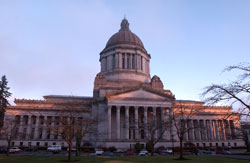Somebody forgot to tell Gov. Christine Gregoire and the Legislature that 2006 is a short, 60-day session. Not much is supposed to happen. According to the standard political formula, lawmakers convene, pass a supplemental budget, and go home to prepare for November’s crucial off-year elections for all members of the state House of Representatives and half the members of the Senate.
Instead, Olympia took on a number of weighty issues, resolved a few, and at press time was still working to resolve even more before the session’s scheduled end on Thursday, March 9.
After 10 years of fighting, state Rep. Ed Murray, D-Seattle, had a huge win when his bill proposing protections against discrimination in housing and employment for gays, lesbians, bisexuals, and transgendered people finally passed the Legislature in January. While Tim Eyman hopes to undo the law with an initiative, Murray notes that no one can take away the success the gay community has already enjoyed. The governor was an enthusiastic backer of the measure and signed the bill in front of 200 supporters on Jan. 31.
Before the session, the governor and legislators promised that Washington would use the country’s energy crisis as a means to promote bio-fuels, other alternative energy sources, and domestic energy production. As of this writing, the most ambitious measure, which would mandate that 2 percent of the state’s diesel and gasoline be bio-diesel or ethanol by 2008, was encountering trouble from the Senate Republican caucus. The energy freedom program, a grant and loan program for funding alternative-energy projects, passed both chambers. It still has to be funded, however. House Capital Budget Chair Hans Dunshee, D-Snohomish, says the Legislature will appropriate $23 million to fund such projects by the end of the session. “Next year, we’ll throw some more in,” he promises.
The state’s unemployment insurance program received another round of reform. In 2003, when Boeing got the moon, the stars, and the sun from legislators, unemployment benefits were cut dramatically. This year, workers got some benefits restored—particularly seasonal employees who had been hit hard by previous changes. Employers also got their unemployment taxes cut because there is a surplus in the state’s unemployment trust fund. “This is an historic and balanced compromise on unemployment insurance,” says state Rep. Steve Conway, D-Tacoma.
The Legislature took on a couple of vexing political problems—and in both cases did the right thing. For the past 11 years, Sen. Dave Schmidt, R–Mill Creek, has tried to prevent an election train wreck by moving the date of Washington’s primary election from the third Tuesday in September to the third Tuesday in August. There simply was not enough time between the September primary and the November general election to ensure that ballots got out on time, particularly for overseas voters. The razor-thin margin in the 2004 gubernatorial election put pressure on legislators to act, and this year they finally did. The new August primary will begin in 2007.
Another political crisis is the way that unregulated money has been flowing into state Supreme Court races and Seattle Port Commission contests. Judicial and port elections were not covered under the 1992 initiative that limits campaign donations. In 2000, the conservative Building Association of Washington dumped $95,000 into the successful Supreme Court campaign of the organization’s lawyer, Jim Johnson. He outspent his opponent three to one and has proved to be everything conservatives hoped for. This year, state Rep. Shay Schual-Berke, D–Normandy Park, successfully pushed legislation that puts a $1,400 donation limit on those races. Big money will still find a way to back candidates, but it will be a little harder.
Perhaps the biggest unresolved issue is Puget Sound regional transportation. King, Pierce, and Snohomish counties have a backlog of transportation projects that have not been fully funded by the state—even though some of the most expensive and important are part of state highways. The Alaskan Way Viaduct—part of Highway 99—and the Highway 520 floating bridge between Bellevue and Seattle are the two most prominent examples of failing infrastructure that does not have enough funding to be replaced. Regional taxpayers need to raise some combination of a motor vehicle excise tax, sales tax, and tolls to get these projects completed. The Legislature was wrangling over when such a measure should go to the ballot. House Democrats didn’t want a big tax package in 2006, when all their members face re-election. And how the proposals are presented also were undecided. One megapackage combining transit and roads, or two separate measures? On Monday, March 6, Murray, the state House Transportation Committee chair, said regional transportation was as likely to pass as die by the end of session.
Even if legislators don’t solve the infrastructure crisis, at least they didn’t bail out the Sonics this year. Seattle’s pro basketball team, looking for taxpayer money to replace KeyArena, will have to wait until next year.








